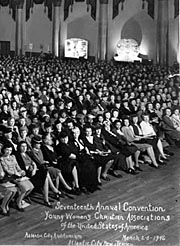|
Interracial
Charter
|
World War II: Interracial Charter, 1946
|
 |
|
National
Convention, 1946
|
In response to pressure from within YWCA branches, notably black women activists in and around Washington, D.C., the YWCA National Convention passed an "Interracial Charter" at Atlantic City in 1946 and took a strong public stand against racism. "Wherever there is injustice on the basis of race, whether in the community, the nation or the world," read the Charter, "our protest must be clear and our labor for its removal, vigorous and steady." What the Charter meant in practice, however, varied greatly throughout the country. Hopes ran high in Portland, and the actions of African-American and Asian-American women staff made a strong and positive impression on many other members of the organization. "There is an excellent racial philosophy in the Business and Professional Department," noted one report on the Portland YWCA, "both in relation to the Negro and Japanese leadership."[1]
However, there were rough spots. As in other cities,
 |
|
Integrated
Christmas Choir, 1946
|
![]()
1. "Visitation Report," by Winnifred Wygal, March 10-13, 1941, Community Files, Administrative Affairs, National YWCA Records, New York City (Microfilm, Reel #207).
Back to Text
2. Quote from "Report of Local Visit," by Esther Briesemiester, February 21-23, 1945, Community Files, Administrative Affairs, National YWCA Records, New York City (Microfilm, Reel #207). See also Teen-age Department Annual Descriptive Report, 1945, Portland YWCA Archives, Portland, Oregon.
Back to Text
![]()
|
YWCA
Today | Programs | African-American
Women |
| Asian-American Women | Religion,
Race, & Reform | Buildings
| Camping |
![]()


